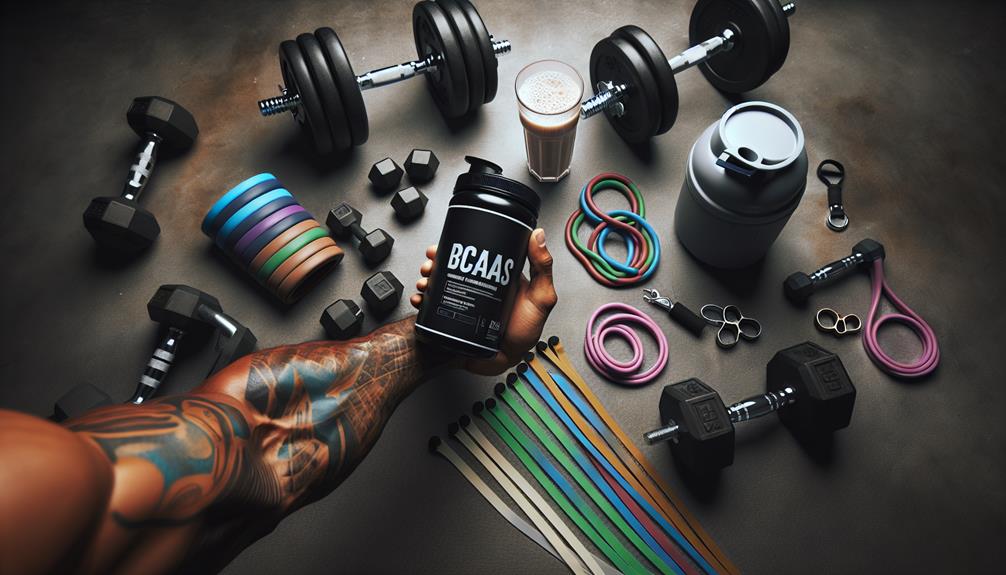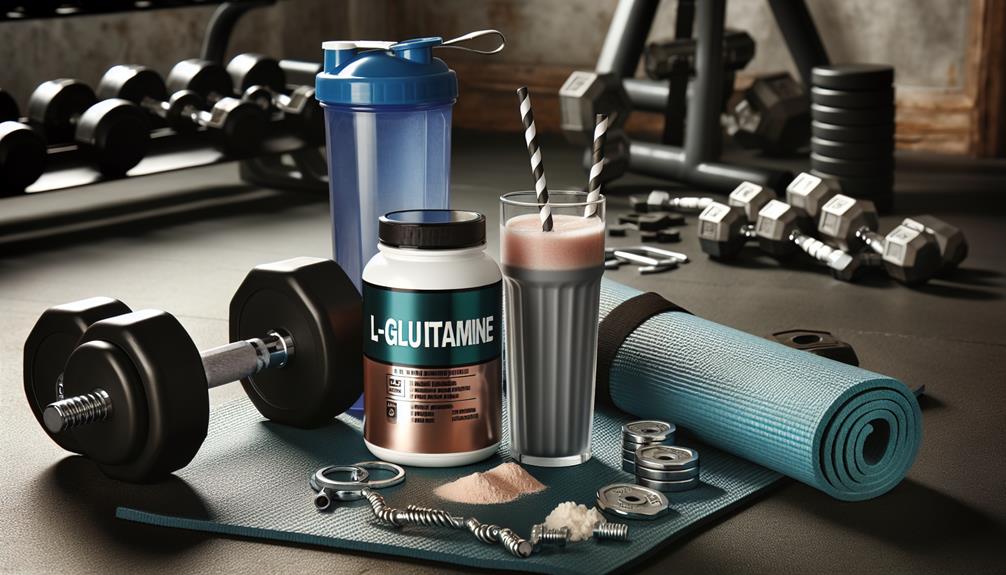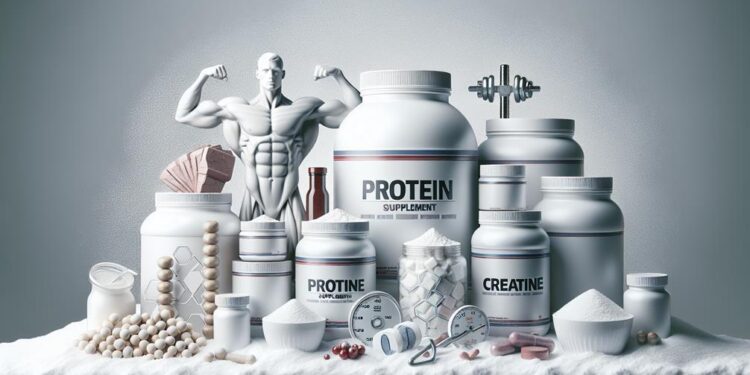When aiming to boost muscle growth, athletes should consider vital supplements. Whey protein is essential post-workout for muscle repair. Creatine monohydrate enhances muscle strength and performance when combined with training. Branched-chain amino acids (BCAAs) aid in muscle recovery and growth, reducing fatigue. Beta-alanine boosts muscle endurance during high-intensity workouts, ideal for sprinters and cyclists. L-glutamine supports muscle recovery and immune health post-exercise. Including these supplements in your routine can optimize performance and recovery. Additional details on each supplement's benefits and usage can further advance your muscle growth goals.
Key Takeaways
- Whey Protein: Maximizes muscle growth and repair post-workout.
- Creatine Monohydrate: Enhances performance and muscle growth.
- BCAAs: Essential for muscle protein synthesis and reduced soreness.
- Beta-Alanine: Boosts muscle endurance and delays fatigue.
- L-Glutamine: Supports recovery, immune function, and muscle repair.
Whey Protein
When it comes to maximizing muscle growth, athletes often turn to whey protein as a key supplement in their nutritional regimen. Protein timing plays a crucial role in muscle repair and growth. Consuming whey protein within an hour after a workout can enhance muscle protein synthesis, leading to better recovery and increased muscle mass. This post-workout window is when muscles are highly receptive to nutrients, making it an optimal time to consume whey protein for maximum benefits.
Whey protein contains high levels of essential amino acids, especially leucine, which is known to stimulate muscle protein synthesis. This makes it an ideal choice for athletes looking to support muscle repair and growth. Additionally, whey protein is quickly absorbed by the body, allowing for fast delivery of nutrients to the muscles.
Incorporating whey protein into your post-workout routine can aid in muscle recovery, repair, and growth. Its convenience, digestibility, and effectiveness make it a popular choice among athletes striving to optimize their performance and achieve their muscle-building goals.
Creatine Monohydrate
Creatine Monohydrate is a widely researched and effective supplement for enhancing athletic performance and muscle growth. Studies have shown that creatine supplementation can significantly increase muscle creatine stores, leading to improved performance in high-intensity, short-duration activities like weightlifting and sprinting. This supplement works by providing energy to the muscles, allowing for increased strength, power output, and muscle endurance during workouts.
When taken consistently and combined with a proper training regimen, creatine monohydrate can help athletes push their limits and achieve greater gains in muscle size and strength. It's particularly beneficial for activities that require short bursts of intense effort, making it a popular choice among bodybuilders, powerlifters, and sprinters looking to enhance their performance.
For athletes aiming to maximize their muscle growth potential and overall performance, creatine monohydrate is a practical and evidence-based supplement to consider incorporating into their regimen. Its proven benefits in enhancing muscle endurance and performance make it a valuable addition to any athlete's supplement stack.
Branched-Chain Amino Acids (BCAAs)

Have branched-chain amino acids (BCAAs) been proven effective in enhancing muscle recovery and promoting muscle growth for athletes? BCAAs are essential amino acids that play a crucial role in muscle protein synthesis, which is vital for muscle recovery and growth. Studies have shown that BCAAs can reduce muscle soreness and damage after intense exercise, potentially improving exercise performance.
| Benefits of BCAAs | Details |
|---|---|
| Muscle Recovery | BCAAs may reduce muscle soreness and damage post-exercise. |
| Muscle Growth | BCAAs support muscle protein synthesis, aiding in muscle growth. |
| Exercise Performance | BCAAs could potentially enhance exercise performance by reducing fatigue. |
| Branched-Chain Amino Acids (BCAAs) | Essential for muscle repair and growth. |
| Dosage and Timing | Take 5-10 grams before or after workouts. |
Including BCAAs in your supplement regimen could be beneficial for athletes looking to optimize muscle recovery and exercise performance. However, it's essential to combine BCAAs with a balanced diet and proper training for the best results.
Beta-Alanine
Beta-Alanine is a popular supplement known for its ability to enhance muscle endurance during high-intensity workouts. By increasing the levels of carnosine in the muscles, Beta-Alanine helps buffer the buildup of lactic acid, delaying the onset of fatigue and allowing athletes to push harder for longer periods. This leads to improved performance during intense training sessions or competitions.
Research studies have shown that supplementing with Beta-Alanine can significantly increase muscle endurance, especially in activities lasting between 1 to 4 minutes. Athletes such as sprinters, cyclists, and rowers can benefit from the performance enhancement provided by Beta-Alanine. Additionally, it may also aid in increasing lean muscle mass over time when combined with a proper strength training regimen.
For individuals looking to maximize their workout potential and break through performance plateaus, Beta-Alanine can be a valuable addition to their supplement stack. Its ability to boost muscle endurance and overall performance makes it a popular choice among athletes striving for continuous improvement.
L-Glutamine

L-Glutamine, a naturally occurring amino acid in the body, plays a crucial role in supporting muscle recovery and immune function for athletes. When it comes to gut health, L-Glutamine is essential as it helps maintain the integrity of the intestinal lining, preventing leaky gut syndrome that can hinder nutrient absorption and overall health. This amino acid is particularly beneficial for athletes due to its ability to aid in the repair and growth of muscle tissue after intense workouts, ultimately leading to faster recovery times.
In addition to gut health, L-Glutamine offers significant recovery benefits by reducing muscle soreness and fatigue post-exercise. By replenishing depleted glutamine stores in the muscles, athletes may experience improved performance and endurance. Furthermore, L-Glutamine supports immune function, crucial for athletes who put their bodies under physical stress, making them more susceptible to illness. Ensuring optimal levels of L-Glutamine through supplementation can help athletes maintain a healthy immune system, allowing them to stay consistent with their training and performance goals.
Frequently Asked Questions
Are There Any Potential Side Effects or Risks Associated With Combining Multiple Muscle Growth Supplements Together?
When combining multiple muscle growth supplements, potential risks and side effects may arise. It's crucial to be cautious, as interactions between different products could lead to adverse effects on our bodies. Consulting a healthcare provider is wise.
How Long Should Athletes Wait After Consuming a Muscle Growth Supplement Before Engaging in Physical Activity or Exercise?
When considering pre-workout timing, it's crucial to allow ample time after consuming a muscle growth supplement before engaging in physical activity. Similarly, post-exercise consumption should be timed strategically to optimize the benefits of the supplement.
Can Muscle Growth Supplements Be Taken on an Empty Stomach or Is It Recommended to Consume Them With Food?
We find it beneficial to have muscle growth supplements with food to enhance absorption rates and minimize potential stomach discomfort. Pre-workout timing matters, and meal timing can optimize results. Fasting benefits might be compromised without food consumption.
Are There Any Specific Brands or Forms of Muscle Growth Supplements That Athletes Should Avoid Due to Poor Quality or Ineffective Ingredients?
When selecting muscle growth supplements, we prioritize ingredient quality and brand reputation. To optimize effectiveness, we steer clear of forms with questionable efficacy and brands known for poor quality. Research and choose wisely for optimal results.
Are There Any Dietary Restrictions or Considerations That Athletes Should Be Aware of When Taking Muscle Growth Supplements, Such as Interactions With Certain Medications or Health Conditions?
When it comes to nutritional considerations and possible medication interactions, athletes must stay vigilant. Dietary restrictions due to health conditions can greatly impact the effectiveness of muscle growth supplements. Always consult professionals for personalized advice.
Conclusion
In conclusion, when looking to maximize muscle growth, incorporating the top muscle growth supplements for athletes can be key. Whey protein, creatine monohydrate, branched-chain amino acids (BCAAs), beta-alanine, and L-glutamine have all been shown to support muscle growth and recovery.
By including these supplements in your regimen, you can optimize your training and reach your athletic goals faster. Remember, consistency is crucial for seeing results, so stay committed and watch your gains grow!













